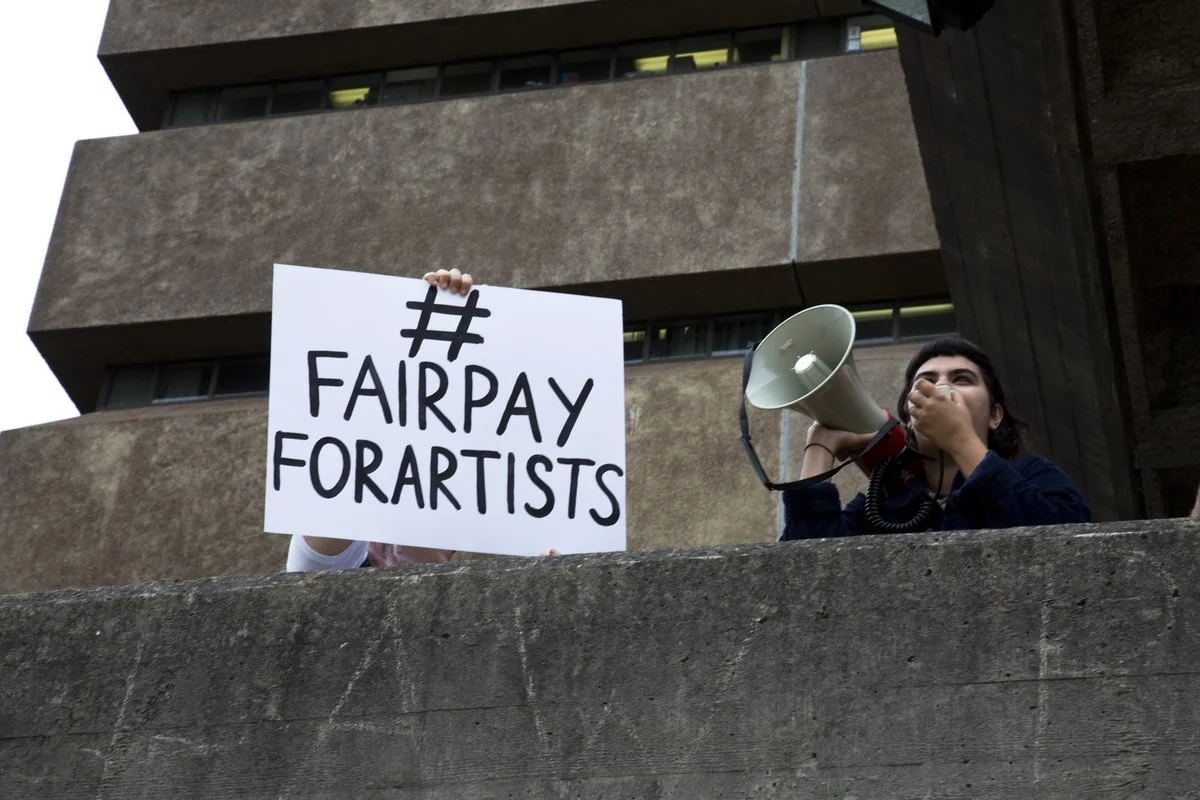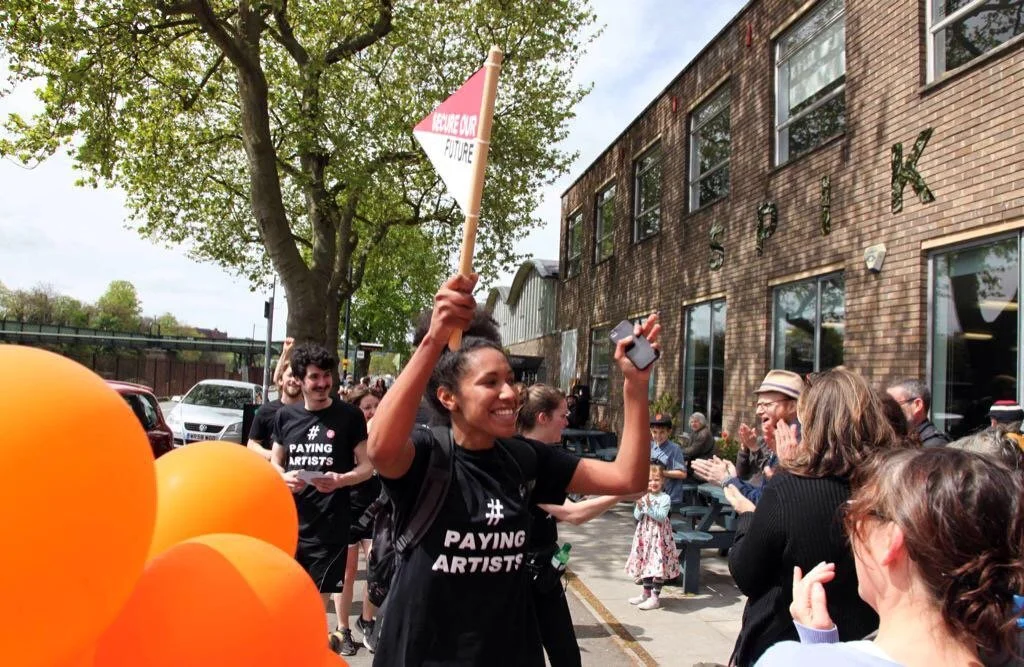Why you should pay young artists
There are many things that we’re passionate about, but one thing that we don’t mess about with is young artists and their pay.
That’s partially why Rising was created, because we recognised the value that young artists contribute to the sector and we believe that they should be properly acknowledged.
According to the Paying Artists Campaign in 2014, the majority of contemporary artists are barely surviving financially, with no or low pay as the norm. We’re lucky to work with so many talented, young artists who are making a real impact and have chosen us to represent them as they perfect their practice, however, they are often expected to work for free or little remuneration.
It’s sad because this has become an industry-wide norm and we want to break the cycle and lead an active example to other organisations and agencies. So much so, that we’ve written it into our manifesto and are committed to only working work with partners who we feel are making an effort to change the way that young artists are seen, acknowledged and paid for their crucial work to the sector.
Paying young artists isn’t just something that we’re passionate about because good for the individual artist(s) and it’s “a nice thing to do” (although, it really is), our reasons are also cultural, political and socio-economical.
Adequately valuing young artists (and artists in general) is important and will positively impact the future talent pipelines, economic growth and the sustainability of our economy. Don’t believe us? Here’s a few reasons why young artists MUST be paid properly.
1. Valuing Young People’s Work and Time
There is a common assumption that being young often equates to being inexperienced and having a lack of expertise. Through the work that we do, we spend a lot of time trying to challenge this misconception and advocating for the valuing of young people’s time, insight and expertise. Many of the young people that we work with have a great deal of knowledge and experience and produce work that is of a high standard – and its important that the world sees that. Cultural ideas of young people always needing ‘exposure’ or expertise allows and facilitates the exploitation of young artists. A lot of time goes into creating a piece of art work or delivering an artistic service (trust us, we know) – its about time that (young) artists are properly and appropriately recognised for their contribution to society and the time that they spend working.
2. Exposure Doesn’t Always Pay
There is a famous trope of organisations and companies offering to pay (young) artists in exposure. “It’ll be great exposure” / “Sorry we can’t offer a fee but this would be a great platform to showcase your work to a new audience”. We hate to break it to you, but exposure doesn’t pay the bills and does nothing for empowering young artists to develop their practice further. With the advancement of social media marketing strategies and the ease at which artists can create their own online portfolios – exposure is no longer valuable currency for young artists. We understand that funding for arts organisations in particular is hard to come by, but we feel that it is important for artists to receive some form of appropriate, valuable and worthwhile renumeration for their time and labour.
Paying Artists Campaign – Libita Clayton takes part in Bristol relay race
3. Diversifying The Arts
As great as it may be, it’s no secret that the arts and culture sector is a very privileged and elitist space. When we think of the cultural and creative sector, we often envision the arts as being diverse and accessible, but a recent arts led study, Panic 2018! reveals that this is not the case. It is increasingly difficult for young people and ethnic minority groups to get employment in the creative industries. As it stands, Bristol is the tenth largest city in the UK and is becoming increasingly diverse. 22% of its residents identified as being ‘non-white British’ in 2011- up ten percent from 2001. As well as becoming increasingly diverse, Bristol is a relatively young city, with 35% of its population under the age of 24 and the average age profile of 33. The report took an intersectional approach to the findings – using the data to paint a picture about barriers that marginalised groups face coming into the industry – situating social class as a large determining factor for an individuals success in the arts sector.
Workforce inequalities are reinforced by the prevalence of the unpaid labour culture in the creative industries through the form of internships and portfolio work. An overwhelming amount of the people see unpaid labour as a form of arts rite of passage and many artists are expected to work for free at the beginning of their careers. The cultural sector tends to be dominated by creatives with affluent class origins and unpaid labour puts many young people at a disadvantage. The expectation for entry-level creatives to work for free creates a barrier for young people who do not have relatives or student loans which they can rely on to get by – making it difficult for those who can’t afford to gain the experience to get into the industry. The status-quo of failing to pay/support young artists helps maintain being an artist as a privileged profession – for white, middle class, older people.
By giving young people payment, you will be supporting the diversification of the arts and ensure diversity of thought, experience and insight in the arts and culture sector.
4. Valuing The Arts
Despite being a fundamental part of our every day lives, art is a seriously undervalued profession. Recent arts-led study, Time To Listen , reveals the power and importance of arts and cultural education to empowering young people and the rest of society. It asserts that “arts subjects help young people to develop the knowledge, capacities and attributes they need for an uncertain future. They improve their wellbeing and help them deal with the pressures of school and adult life”. There needs to be more space and prestige associated with promoting arts as a valuable and viable career option. There is often this societal assumption that because artists are doing something that offers self-fulfilment, that they don’t need to be paid, as it is not ‘a proper job’. It can be argued that in a world that is becoming more polarised and uncertain, art serves not only as a bridge but a vessel for understanding and exposure to different points of views, opinions and perspectives. We believe that the value that arts and culture has on the world is priceless and it shouldn’t need a monetary value to determine it’s worth, but on the other hand, undervaluing it can be damaging.
So that’s it from us. These are just a few reasons why we’re so passionate about ensuring young people are paid for their work and their time. If you’re asking young people to work for you, we expect them to be paid an appropriate freelance fee plus prep time. We understand that money/funding in the arts is hard to come by – especially nowadays – but in order to break the cycle, we need to start investing in our artists and ensuring that their work is appropriately valued.


